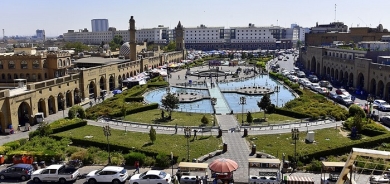Damascus rejects Arab League-U.N. peacekeepers proposal to tackle Syrian crisis

The Arab League proposed a joint United Nations taskforce to assist their crackdown on President Bashar al-Assad’s repression of civilian protesters at a crisis meeting in Cairo on Sunday.
But the decision was met with immediate dismissal from the Syrian regime, which announced through its state news agency that the Arab League’s decisions have been rejected.
Syria’s ambassador to the Arab League, Ahmed Youssef, was quoted as saying that Saudi Arabia and Qatar were “living in a state of hysteria after their last failure at the U.N. Security Council to call for outside interference in Syria’s affairs and to impose sanctions on the Syrian people,” according to the Associated Press.
On Sunday, the bloc said that a U.N.-Arab peacekeeping force would replace the 170 Arab observers deployed in Syria in December but recalled last month.
The Arabs are now to “ask the U.N. Security Council to issue a decision on the formation of a joint U.N.-Arab peacekeeping force to oversee the implementation of a ceasefire,” a statement read after the meeting.
Britain has already said it wants to have urgent discussions with the Arab League over the group’s proposal for a joint U.N. peacekeeping force.
Hague also welcomed the Arab League’s decision at a meeting in Cairo on Sunday to endorse a “Friends of Syria” group, including Britain, which will meet in Tunisia on February 24.
“We will discuss urgently with the Arab League and our international partners the proposals for a joint AL/UN peacekeeping force,” Hague said in a statement.
“Such a mission could have an important role to play in saving lives, providing the Assad regime ends the violence against civilians, withdraws its forces from towns and cities and establishes a credible ceasefire.”
Saudi Foreign Minister Saud al-Faisal had expressed the 22-nation League’s deep frustration with the Syrian crisis, telling delegates in the meeting that it was no longer appropriate to stand by and watch the bloodshed.
“Until when will we remain spectators?” he said. The bloodshed in Syria “is a disgrace for us as Muslims and Arabs to accept.”
The Arab bloc also voted to cut off all diplomatic ties with the Assad regime and reinforce economic sanctions.
“The time has come for a decisive action to stop the bloodshed suffered by the Syrian people since the start of last year,” Arab League chief Nabil al-Arabi told the Arab foreign ministers. “We must move quickly in all directions ... to end or break the ongoing cycle of violence in Syria.”
The League also voiced support for anti-regime groups, calling for “communication channels with the Syrian opposition and providing all forms of political and material support to it.”
It urged Syrian opposition groups to unite ahead of a Feb. 24 meeting in Tunisia of the “Friends of Syria” group, which includes the United States, its European allies and Arab nations working to end the uprising against Assad’s authoritarian rule.
The group was created after last weekend’s veto at the U.N. by Russia and China of a Western and Arab draft resolution that would have pressured Assad to step down. That resolution also would have demanded that Assad halt the crackdown on dissent and implement the Arab League peace plan that calls for him to hand over power to his vice president and allow creation of a unity government to clear the way for elections.
At the Cairo meeting, foreign ministers from the six-nation Gulf Cooperation Council proposed that all Arab League nations withdraw their ambassadors from Damascus and expel Syria’s ambassadors from their capitals, according to officials.
The proposal was not mentioned in the resolution, but the clause calling for a halt to all diplomatic contacts with Syria appeared to reflect a compromise.
The six Gulf nations, particularly Saudi Arabia and Qatar, have been campaigning for a tougher stand against Assad’s regime and may offer formal recognition of the National Syrian Council, the largest of Syria’s opposition groups.
Assad’s regime has pursued a harsh crackdown against the uprising since it began last March. More than 5,400 people have been killed, according to a U.N. estimate in January. That figure has not been updated because the chaos in Syria has made it all but impossible to do so, and hundreds have been reported killed since.
(AFP)














